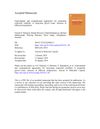 January 2025 in “AAPS PharmSciTech”
January 2025 in “AAPS PharmSciTech” Transethosomes improve drug delivery through the skin and show promise for treating various conditions.
March 2024 in “Antioxidants” Excessive blue light harms eye cells and disrupts sleep patterns.
March 2024 in “International journal of molecular sciences” Three specific genetic variants cause severe skin issues in children with EBS, highlighting the need for early genetic screening.
 March 2023 in “Scientific Reports”
March 2023 in “Scientific Reports” Using focused ultrasound on the brain can help epilepsy medicine work better in rats.
January 2023 in “Applied sciences” Equisetum debile extracts may help with skin whitening, anti-wrinkle, and anti-hair loss treatments.
 August 2021 in “Journal of Fundamental and Applied Pharmaceutical Science”
August 2021 in “Journal of Fundamental and Applied Pharmaceutical Science” Black tea extract at 5% concentration promotes the most hair growth.
 33 citations,
June 2007 in “International Journal of Pharmaceutics”
33 citations,
June 2007 in “International Journal of Pharmaceutics” The conclusion is that measuring how drugs partition into artificial sebum is important for predicting their delivery into hair and sebaceous follicles, and it provides better information than traditional methods.
 January 2024 in “Forte Journal”
January 2024 in “Forte Journal” The hair oil with lemongrass and coconut oil promotes hair growth effectively.
Hair proteins in preschool children and their mothers could indicate developmental changes and health status.
 4 citations,
December 2018 in “Macedonian Journal of Chemistry and Chemical Engineering”
4 citations,
December 2018 in “Macedonian Journal of Chemistry and Chemical Engineering” A new method accurately measures amino acids in treated hair, showing bleaching reduces amino acids while protein treatments increase them.
 52 citations,
June 2013 in “The Journal of Clinical Endocrinology and Metabolism”
52 citations,
June 2013 in “The Journal of Clinical Endocrinology and Metabolism” The research found that anovulatory young women have higher androgen and hormone levels than those who ovulate, suggesting immature hormonal regulation rather than a specific condition.
 9 citations,
January 1999 in “Journal of Liquid Chromatography & Related Technologies”
9 citations,
January 1999 in “Journal of Liquid Chromatography & Related Technologies” Best results found using acetonitrile, water, and trifluoroacetic acid or methanol mixture.
 38 citations,
June 2005 in “Matrix Biology”
38 citations,
June 2005 in “Matrix Biology” Minoxidil affects collagen-related genes, potentially helping treat fibrosis.
 7 citations,
February 2019 in “Journal of Molecular Liquids”
7 citations,
February 2019 in “Journal of Molecular Liquids” Minoxidil dissolves better in propylene glycol and water as temperature and propylene glycol amount increase.
 76 citations,
February 2015 in “Industrial Crops and Products”
76 citations,
February 2015 in “Industrial Crops and Products” Researchers found over 40 compounds in Bituminaria bituminosa, including many flavonoids and some with potential for medical and hair care uses.
 15 citations,
October 2016 in “Steroids”
15 citations,
October 2016 in “Steroids” Researchers developed a new method to find substances in herbs that can block a specific enzyme linked to hair loss.
 3 citations,
July 2019 in “Experimental Dermatology”
3 citations,
July 2019 in “Experimental Dermatology” Hair loss patients may have different polyamine levels in various scalp areas.
 18 citations,
January 2013 in “Postepy Dermatologii I Alergologii”
18 citations,
January 2013 in “Postepy Dermatologii I Alergologii” Puberty often causes skin issues like acne and excessive sweating, and treatments require patience as results may vary.
 7 citations,
February 2014 in “Talanta”
7 citations,
February 2014 in “Talanta” Researchers developed a method to identify and analyze cyclosporin compounds and their structures effectively.
 18 citations,
June 2010 in “Journal of Chromatography B”
18 citations,
June 2010 in “Journal of Chromatography B” New method measures finasteride in blood quickly and accurately.
 16 citations,
February 2018 in “European Journal of Endocrinology”
16 citations,
February 2018 in “European Journal of Endocrinology” Diagnosing hyperandrogenism in women is complex and requires accurate testing methods and consideration of SHBG levels.
 12 citations,
January 2020 in “Analyst”
12 citations,
January 2020 in “Analyst” Researchers found markers that can tell if hair has been bleached, which could improve hair test accuracy.
 16 citations,
June 2022 in “Agronomy”
16 citations,
June 2022 in “Agronomy” Certain natural biostimulants can increase lettuce yield and improve its nutritional content.
1 citations,
January 2021 in “Processes” Researchers successfully grew horse skin cells that produce pigment from hair follicle samples.
 16 citations,
September 2018 in “Journal of Molecular Liquids”
16 citations,
September 2018 in “Journal of Molecular Liquids” The PS-b-PAA copolymer nanomicelles are effective for delivering a cancer treatment drug in photodynamic therapy.
 6 citations,
March 2021 in “International Journal of Pharmaceutics”
6 citations,
March 2021 in “International Journal of Pharmaceutics” Optimal long-acting finasteride injection dose found: 16.8 mg, effective for one month.
82 citations,
May 2010 in “PLoS neglected tropical diseases” Secondary syphilis in Cali, Colombia, shows high Treponema pallidum presence and challenges in early diagnosis, needing better public health strategies.
 823 citations,
February 1998 in “Analytical Chemistry”
823 citations,
February 1998 in “Analytical Chemistry” Method detects finasteride in plasma at very low concentrations.
 35 citations,
April 2014 in “Journal of proteomics”
35 citations,
April 2014 in “Journal of proteomics” Feed restriction in sheep leads to finer wool fibers but may reduce wool quality.
 10 citations,
June 2014 in “Journal of Pharmacy and Pharmacology”
10 citations,
June 2014 in “Journal of Pharmacy and Pharmacology” Germacrone in Curcuma aeruginosa extract degrades at high temperatures but is stable in certain solutions and unaffected by pH levels.
























